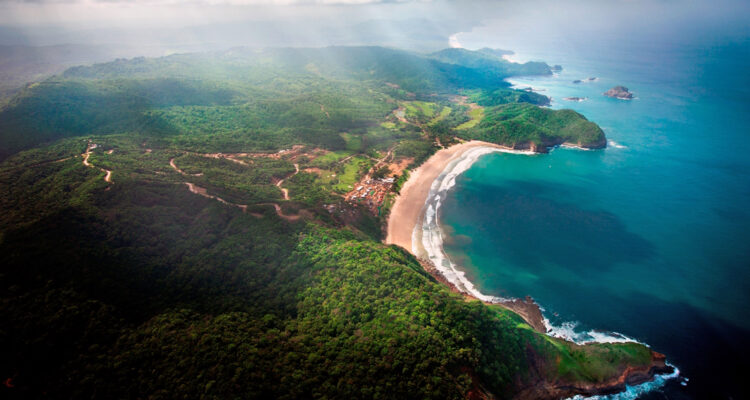An excerpt from the book A Driven Mind by Garry Sowerby
It was May of 1978. My girlfriend at the time, Solange Fortin, and I had just spent a few days in Panama City, Panama.
After five months on South America’s gringo trail, the bright lights and cosmopolitan atmosphere of the city were a welcome change of pace. But on the cab ride to the airport to catch a flight Miami, an idea surfaced.
“How about hitchhiking?” I asked.
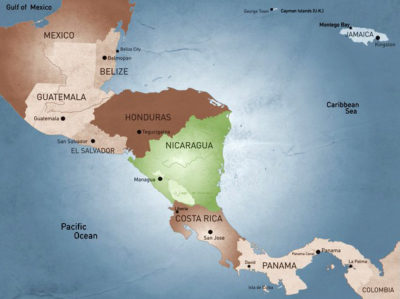
Solange nodded and directed the cabby to drop us at the end of Thatcher Ferry Bridge on the west side of the Panama Canal. From there, the Interamerican Highway would take us to the Costa Rican border, 500 kilometres away.
I knew roads continued up to Mexico but was foggy on what countries were involved, how long it would take and en route political situations. Transit visas and paperwork would be sorted out as our trek through Central America unfolded.
We got a drive almost immediately with a chain-link fence salesman headed to Aguadulce, a port town three hours up the line. The bustle of Panama City soon evaporated into sweeping savannas speckled with clumps of fluorescent green mango trees and stately palm groves.
As we waited for the next drive, Solange pored over the South American Handbook.
“We have a safety valve. There’s an express bus service called Tica that runs between Central American capital cities on a daily basis.” Although caving in to the Tica Bus was not high on my priority list, I felt relieved about a daily mobility option.
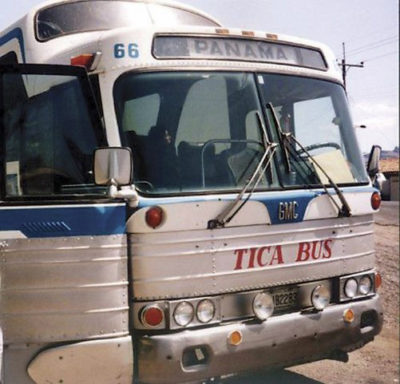
Two hours later I detected the high-pitched whine of a flat-out engine. Then, a speeding bus roared past blowing the hat I had purchased in Puno, Peru into the middle of the Interamerican Highway. As the behemoth faded into nothingness, two words emblazoned across the front of the speeding people-mover finally registered… TICA BUS.
“Well that’s it for today!” I laughed, chasing my Puno hat across the road. Solange was not amused.
We made it to David, capital of Chiriqui Province, and holed up in a tidy wooden hotel where we had a swinging night stretched out on hammocks haphazardly strung throughout the lobby and courtyard.
In the morning it was back to the Interamerican Highway. Drivers waved and honked their horns. Another Tica Bus screamed past us as Solange’s mood deteriorated. The gloss of hitchhiking through Central America was wearing thin and I was anticipating a rupture when I heard the hissing airbrakes of an 18-wheeled White Freightliner transport truck.
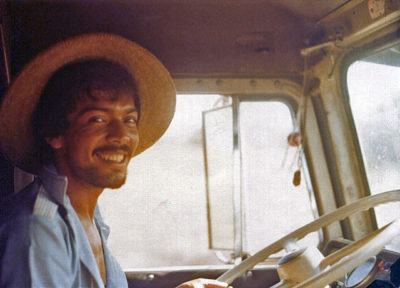
Once inside the hot cramped cab, Pedro, a pleasant fellow in his early 20s, told me he was on his way to San Salvador, the capital of El Salvador. That meant one drive all the way through Costa Rica, Nicaragua and Honduras. He figured it would take us three days so we settled back, Solange by the passenger’s window gasping for air while I sat on top of the engine compartment. Pedro kept one eye on the road while the other darted back and forth between my Puno hat and the shapely Solange.
After a six-hour delay at the Costa Rican border, we motored north toward Nicaragua. We had heard stories about The Sandinistas National Patriotic Front threatening President Somoza’s longstanding grip on power in the oppressed country.
Clearing out of Costa Rica was straightforward. But the tension grew as we drove through a 2-mile stretch of no-man’s-land to the Nicaraguan border post. Solange and I climbed down from the grubby Freightliner and were led to a small dilapidated shack behind the main control post. An official took our passports and returned a few minutes later to order us to get our bags from the truck.
Pedro threw them down to us before driving off. As he pulled away, I noticed my Puno hat on his head.
Back at the shack the situation deteriorated as three soldiers fingered their weapons. Our 18-wheeled ticket was headed north with the Puno hat. The post was closing in ten minutes and our lack of transit visas was causing a stir among the border officials.
Shortly, another gentleman entered the room. Our guards cringed. The highly-adorned shoulder epaulets on his uniform confirmed my suspicion that Head Honcho had arrived. He was obnoxious, obviously drunk.
Without saying a word, Captain Honcho took off his watch and casually dropped it into my shirt pocket. The bottom of his necktie had been dipped into something red, tomato soup perhaps, and the dried-up flakes made me nauseous. He laughed in my face then sat down at a gritty desk strewn with tattered papers.
The situation spiraled from bad to ugly when two guards pointed their rifles at us. I had Head Honcho’s watch in my shirt pocket, our papers were not in order and the boss was having an inebriated yuck over it.
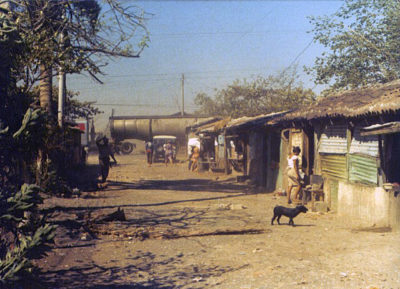
Then Solange’s fiery temper fueled her extensive Spanish vocabulary into an eloquent scolding. Laughing ceased. Rifles were lowered and the border bullies clammed up. I handed the watch back to Head Honcho who motioned his henchmen to escort us back to the Costa Rican frontier.
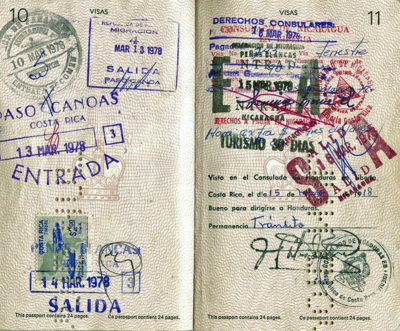
We would have to travel south to the Costa Rican town of Liberia where the pesky transit visas could be scored. The border was closed by then but we managed seats on a bus packed with Panama-bound Nicaraguans.
In Liberia, we spent the night beside the Interamerican Highway in a disgusting hotel room. Suffocating heat and the traffic kept me awake until 3:00 am.
A loud truck woke me at sunrise. The whine of its engine sounded different from the others. The Tica Bus!
“That’s it for today,” I laughed, as the sound grew faint.
Good thing Solange was still asleep.
Follow Garry on Instagram: @garrysowerby



